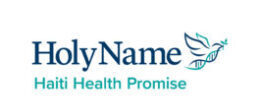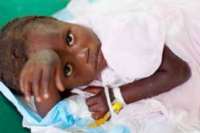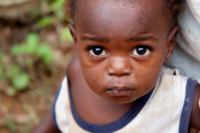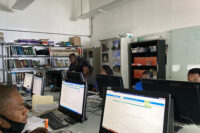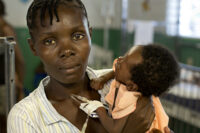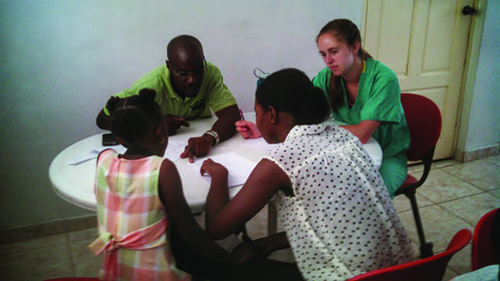 By Lindsay Tishberg, Molly Hallweaver, Joseph Kahan
By Lindsay Tishberg, Molly Hallweaver, Joseph Kahan
The door creaked open as Marie and her sister entered the large administrative conference room at Hôpital Sacré Coeur in Milot, Haiti. Marie saw several of her friends and quickly ran over to talk to them. It was 9 a.m. on a hot Saturday in July and the room was already almost full of patients for Dr. Exavier’s monthly diabetes clinic. These clinic days are exciting and important days for Marie — she not only receives her monthly supply of insulin and other essential supplies, but she is also able to talk with other kids who struggle with Type 1 Diabetes.
 Type I Diabetes — also known as Juvenile Diabetes — is very different from the more common Type II Diabetes. Unlike Type II Diabetes, the onset of Type I Diabetes has nothing to do with diet or lifestyle. In Type I Diabetes, for reasons not completely understood, the body does not produce insulin — a hormone that is needed to convert sugar, starches, and other foods into energy.
Type I Diabetes — also known as Juvenile Diabetes — is very different from the more common Type II Diabetes. Unlike Type II Diabetes, the onset of Type I Diabetes has nothing to do with diet or lifestyle. In Type I Diabetes, for reasons not completely understood, the body does not produce insulin — a hormone that is needed to convert sugar, starches, and other foods into energy.
There’s nothing one can do to prevent Type I Diabetes, and currently, there is no cure for it.
But, it can be managed with proper treatment. Insulin is required for these patients to survive. Type I Diabetics must carefully balance insulin doses (either by injections multiple times a day or continuous infusion through a pump) with eating and other activities. Many patients have to prick their fingers up to 6 times a day to measure their blood glucose.
It is a challenging disease to manage for any child — and particularly difficult in a low resource setting like Haiti.
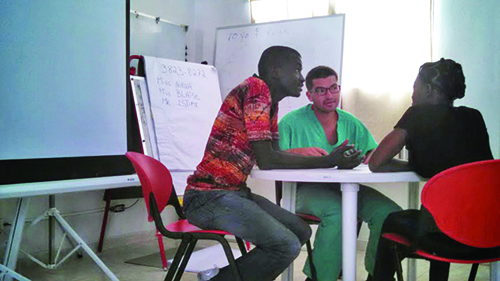 Marie is 18 years old and is one of the veterans of the group — she was diagnosed with Type 1 Diabetes more than 3 years ago and has been an integral member of Dr. Exavier’s newly formed diabetes clinic. She has been attending these group Diabetes sessions almost monthly since they began 10 months ago. The diabetes program was formed in October of 2013 after Dr. Exavier, one of the pediatricians at HSC, began diagnosing a rising number of children with Type 1 Diabetes. Dr. Exavier is an experienced pediatrician, but he has never received specialized training as an endocrinologist — the specialists who typically manage diabetic patients in more developed countries like the United States. However, as an increasing number of his patients were becoming hospitalized with life-threatening complications from Type I Diabetes, Dr. Exavier realized that something had to be done to help his patients better manage their disease.
Marie is 18 years old and is one of the veterans of the group — she was diagnosed with Type 1 Diabetes more than 3 years ago and has been an integral member of Dr. Exavier’s newly formed diabetes clinic. She has been attending these group Diabetes sessions almost monthly since they began 10 months ago. The diabetes program was formed in October of 2013 after Dr. Exavier, one of the pediatricians at HSC, began diagnosing a rising number of children with Type 1 Diabetes. Dr. Exavier is an experienced pediatrician, but he has never received specialized training as an endocrinologist — the specialists who typically manage diabetic patients in more developed countries like the United States. However, as an increasing number of his patients were becoming hospitalized with life-threatening complications from Type I Diabetes, Dr. Exavier realized that something had to be done to help his patients better manage their disease.
Dr. Exavier sought advice and support from pediatricians and endocrinologists in the states. He designed his diabetes clinic as a group appointment model — similar to some of the most innovative practices that are currently being implemented in the United States. He was even able to send four of his patients to a camp for Type I Diabetics in Port-Au Prince, another successful model utilized throughout the developed world.
Yet Dr. Exavier openly admits that there is so much more he can do for his patients and he wants to expand on the services he can provide. “I want to create a diabetes clinic that provides and integrates all of the care and services that these kids need,” he said recently.
Diabetes is a chronic disease that requires a multidisciplinary approach. A strong treatment program involves knowledge about insulin use, nutrition, hydration, and exercise. Family support and understanding is integral to improved management, and this is one of the strengths of Dr. Exavier’s clinic design.
For Marie, her group visits have been the most important part of her treatment program. She has found a social network of support with peers who face the same challenges.
They see each other every month and are able to discuss managing the many challenges, like struggling to attend school, or understanding proper nutrition and exercise. Marie and her friends often ask Dr. Exavier questions about how often she should check her blood sugar and how best to ration her insulin.
Marie’s sister accompanies her on almost every visit, along with the parents and friends of many other patients. Here, family members have an opportunity to talk with each other about the challenges their families face. There are three diabetic children from one small town, Limonade, and their families have decided to rotate among themselves who will chaperone their kids to the clinic on a given month.
On this hot and humid July day — typical of Haiti weather this time of year — Marie notices several new faces. Two 10-year-old girls are here for their first diabetes appointment after being diagnosed in the past two weeks. Parents of each of the girls look around anxiously, not knowing what to expect. Yet, this is the perfect forum to welcome new patients. Concerned parents can talk to other parents about challenges and solutions that have worked well. And these two younger girls are able to talk and work with other patients like Marie.
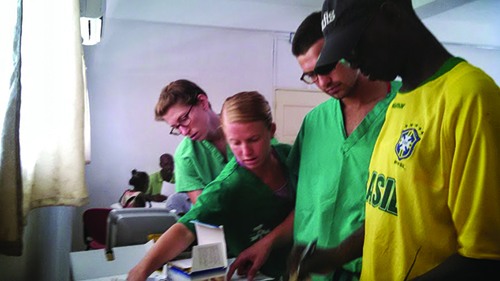 In the weeks after their diagnoses and before this group visit, these two younger girls admitted that they had no idea what to think about their new disease. “I thought I was going to die…what if all my friends stopped liking me?” Psychologically, a diagnosis of diabetes is incredibly difficult and it is invaluable for these younger girls to see a strong, determined, and optimistic young woman like Marie succeed in living with diabetes.
In the weeks after their diagnoses and before this group visit, these two younger girls admitted that they had no idea what to think about their new disease. “I thought I was going to die…what if all my friends stopped liking me?” Psychologically, a diagnosis of diabetes is incredibly difficult and it is invaluable for these younger girls to see a strong, determined, and optimistic young woman like Marie succeed in living with diabetes.
Despite the strength of Dr. Exavier’s group program, his patients and clinic face incredible challenges — some of which would be unheard of in the United States. For the past 8 months, Dr. Exavier has been relying on insulin from AYUDA, an American organization that helps support Type I Diabetics abroad.
In late July, Dr. Exavier received news that for the next month, he would not be receiving any insulin for his patients. “Unfortunately, this is a common occurrence,” he said.
There is very little that Dr. Exavier can do for his patients when they do not receive insulin. He might try to adjust their dosing so his patients take less insulin for a longer period of time. But eventually, they run out of insulin, and their blood sugar skyrockets invariably leading to diabetic ketoacidosis (DKA), the most feared and deadly complication of Type 1 Diabetes. As such, hospitalizations almost always increase during these months.
As part of the Tufts in Haiti program we are three medical students who recently returned from a two-month stint working with Dr. Exavier and HSC. Our public health research focused on assessing the challenges and perceived quality of life of children with Type 1 Diabetes, in addition to measuring the impact and benefits of Dr. Exavier’s diabetes clinic. From our preliminary data, we know that the clinic holds great promise to help these patients manage their diabetes, but there is definitely room for improvement.
We were inspired by Dr. Exavier’s commitment and dedication to his diabetic patients and were profoundly impacted by the challenges related to simple lack of insulin and necessary supplies.
While we have committed $690 of our own funds to supply one month’s worth of insulin and supplies for all of his 23 patients, we are hopeful that an emergency diabetes CRUDEM fund can be created so that patients like Marie never again have to risk running out of basic insulin.
Thank you in advance for your support.
As part of an effort to care for pediatric diabetic who present at Hôpital Sacré Coeur, The CRUDEM Foundation, Inc. has created a fund to defray operating expenses connected with the care of these patients. Interested donors can contribute to this fund, which will be used to purchase insulin, facilitate examinations and cover hospitalization costs of pediatric diabetics.
The fund will cover the following expenses:
| • Insulin • Glucometers and related supplies (batteries, strips, etc.) • Hospital inpatient and outpatient fees • Transportation for patients to the hospital |
• Antibiotics and other pharmaceuticals • Personnel expenses • Consultant expenses |
Your generous donation will quite literally save a child’s life.
Giving does not get more significant than that!
Thank you for your generous support!
| To make a secure online donation, please use the PayPal button to the right. You may also send a check made out to: |
